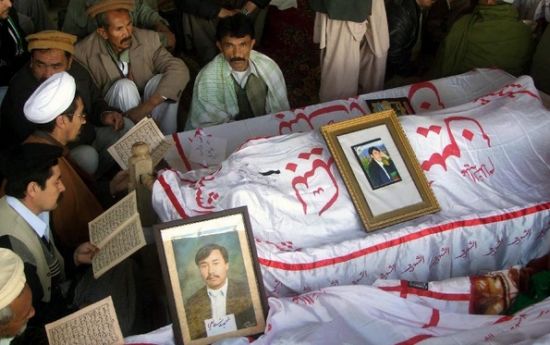Pakistani cabinet ministers on Tuesday opened negotiations with protesters who are demanding army protection and refusing to bury victims of the deadly bomb attack that killed 89 people in Quetta.

Thousands of angry Pakistanis called off nationwide protests Tuesday and agreed to bury the dead from a bomb attack that killed 89 people, after the government promised to arrest those responsible.
Pakistani cabinet ministers on Tuesday opened negotiations with protesters who demanded army protection and refused to bury victims of the deadly bomb attack in Quetta.
Saturday's attack, the second bomb targeting the Muslim Hazara minority in five weeks in the southwestern city, has brought hundreds of protesters onto the streets across the country and shut down parts of Karachi, Lahore and Islamabad.
Prime Minister Raja Pervez Ashraf sent ministers to Quetta to negotiate with the protesters and ordered an "immediate launch of a targeted operation" against those responsible, his office said without elaborating.
Local officials in Quetta announced earlier Tuesday that security forces had killed four men and arrested seven including an alleged mastermind of Saturday's bombing in an "ongoing" raid on the edge of the city.
Police said another 172 people had been rounded up in the surrounding province of Baluchistan in the past two days, including the provincial chief of extremist outfit Ahle Sunnat Wal Jamaat, and they were now being questioned.
The president of the Shia Ulema Council, Sajid Naqvi, warned the protests could intensify if they were not happy with Tuesday's meeting with ministers.
Thousands of angry demonstrators maintained their protest vigil in Quetta for a third day on Tuesday, refusing to bury the dead until the authorities take action, and laying scores of coffins in neat rows, most decorated with pictures of the victims from Saturday attack.
A similar protest, after suicide bombers killed 92 people at a Hazara snooker hall in Quetta on January 10, lasted for four days until Islamabad sacked the provincial government and imposed governor's rule.
Amnesty International repeated calls for Pakistan to do more to protect Hazaras, describing the failure to bring those responsible to justice as "shocking".
Attacks targeting Muslims in Pakistan have claimed almost 200 lives already this year. Human Rights Watch said more than 400 were killed in 2012.